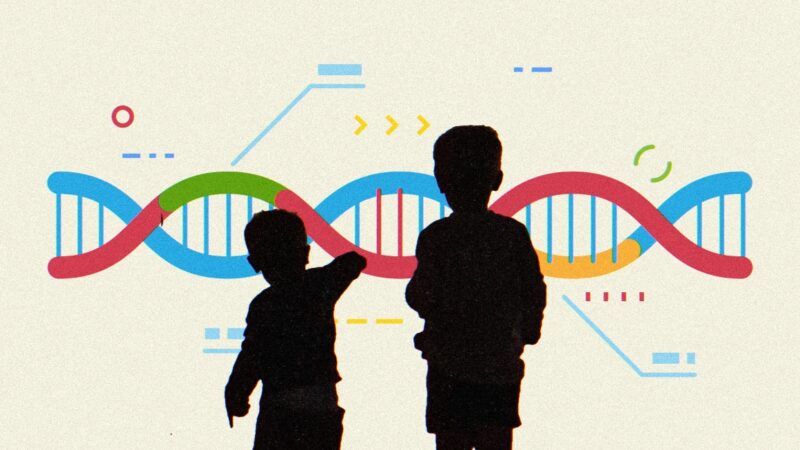You Do Not Need To Store Your Kids' DNA in Case of Emergencies
Fearmongering about mass school shootings leads to some dumb, privacy-threatening ideas.

The Today show this week offers an alarming headline about how Texas is handling school shootings: "Texas schools send parents DNA kits to identify their kids' bodies in emergencies."
The headline is true, but the story's framing is misleading. More importantly, parents who get DNA kits from their schools should simply dump them in the trash and go about their day. The tests are unnecessary, and hanging onto your child's DNA data compromises his or her privacy for little gain.
In 2021, Texas lawmakers passed a bill, S.B. 2158, mandating that all schools (including open-enrollment charter schools) send home fingerprint or DNA kits "on request" to parents of parents or legal guardians of children up through middle school. Parents may then use the kits and submit the identifying information to law enforcement officials if their child is kidnapped or trafficked. Participation is completely voluntary, and parents are supposed to keep the DNA samples at home in case something happens to their children.
The bill was not introduced as a measure to identify the bodies of children killed by school shooters, as Today frames it. The bill was introduced by Texas State Sen. Donna Campbell (R–New Braunfels) as part of a national collaborative effort for the National Child Identification Program to fingerprint America's kids to help investigate kidnapping. We can argue the merits of whether we should be fearmongering parents into getting their kids fingerprinted over kidnapping panics. Still, to be clear, the bill was not introduced or passed for anything to do with school shooters.
Much of this is lost in Today's story, which instead leans heavily on fear and panic and casts the law as Texas' response to school shootings, instead of implementing harsher gun control measures. The story notes that the bill was passed after a deadly school shooting in Santa Fe High School in Santa Fe, Texas, and before the Robb Elementary School Shooting in Uvalde, Texas, which suggests that the Santa Fe shooting inspired the bill.
Today's piece is fundamentally about people being mad that Texas isn't doing more about guns. It has this juicy, just-too-perfect, totally-spontaneous-I'm-sure quote from Tracy Walder, a former CIA and FBI agent and current college professor, who says her second-grade daughter would be sent home with a kit (even though the law says schools are supposed to provide them on request, not unprompted): "You have to understand, I'm a former law enforcement officer. I worry every single day when I send my kid to school. Now we're giving parents DNA kits so that when their child is killed with the same weapon of war I had when I was in Afghanistan, parents can use them to identify them?"
Well, as a former law enforcement officer, Walder should know full well that the reason so many children died at Robb Elementary School had nothing to do with the type of gun the shooter had but because the police sat on their thumbs and did nothing while the violence played out.
Today, which is usually good at inspiring fear, weirdly glosses over the privacy issues at play here. The story notes that "some parents feel uncomfortable sending their DNA to anyone for privacy reasons." Good, because parents shouldn't do that and don't need to. The story notes that when officials struggled to identify some of the victims of the Robb Elementary shooting, they could do so by comparing DNA samples of the bodies to those of family members. There is no need to permanently keep DNA samples on hand to share with authorities.
And what exactly happens to these DNA samples isn't entirely clear, even under Texas statute. Under Texas law, fingerprint cards and photographs made and kept under these statutes "may not be used as evidence in any criminal proceeding in which the child is a defendant." Another part of the code specifies that fingerprints may only be used to identify or locate a missing child. But the statutes do not have similar restrictions on the use of DNA samples.
We've already seen police misuse DNA data collected for other purposes in San Francisco, where investigators used DNA collected from rape victims to prosecute completely unrelated crimes.
Don't let blatant fearmongering push you into doing something reckless, like handing your child's DNA information to authorities. It's not necessary, and it compromises your family's privacy for very little gain.


Show Comments (32)